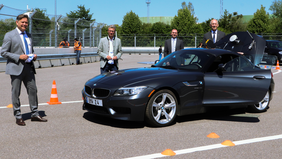The Bavarian State Minister of Science and Art Bernd Sibler visited Technische Hochschule Ingolstadt (THI) as the new Bavarian AI mobility node. In this function, the THI researches AI technologies for autonomous driving and unmanned flight as well as in automobile production. As cross-sectional topics, AI-based mobility services and business models as well as questions of ethics, acceptance and technology consequences in relation to AI are investigated, as well as AI-based mobility infrastructure and AI methods. In addition, THI coordinates the Bavarian AI mobility network in cooperation with other Bavarian universities.
In line with the research focus on safe autonomous driving, Minister of State Sibler gained an impression of the current AI research at THI during his visit to Ingolstadt, including an AI-based driving test on the university's outdoor test track. Prof. Dr. Michael Botsch, Scientific Director of the Ingolstadt AI Research Centre AININ and head of the Master's programme "Automated Driving and Vehicle Safety", presented how AI can be used in safe automated driving. He demonstrated a live driving test in which automatically controlled vehicles interacted in a real roundabout situation and reacted to unprotected road users (pedestrians).
Minister of State Bernd Sibler: "Innovation is at home at Ingolstadt Technical University, this is where visions become reality, this is where the mobility of the future is researched and designed. It is therefore only logical that it is also the centre of the Bavarian AI mobility network, which extends from Aschaffenburg via Landshut to Regensburg. In the field of AI-based mobility of the future, we are moving into the fast lane with the ten professorships to strengthen the AI hub in Ingolstadt and an additional professorship from the open AI competition".
The THI is already active in the field of AI research as one of Germany's strongest universities of applied sciences: 30 research-active professors and 125 scientific staff work in the fields of mobility and AI - from AI-based damage detection in production to adaptive battery systems and AI applications in automated driving. In addition, there are eleven new AI professorships for mobility from the High-Tech Agenda Bavaria, two new AI research professorships from the THI and six new endowed professorships within the framework of the Research Center for Artificial Intelligence and Machine Learning AININ, which is located at the THI. At the AI mobility node in Ingolstadt, more than 100 basic and third-party funded scientists are to be established by 2025 together with the professorships.
THI President Prof. Dr. Walter Schober: "Thanks to Bavaria's High-Tech Agenda and the resulting research offensive of the Free State, the Bavarian AI mobility node is being created at the THI. In this way, we are establishing a network that will highlight Bavaria as a leading region for AI-supported mobility concepts".
State Minister Bernd Sibler visits the THI as the new Bavarian AI mobility node
Photo: (from left) Alfred Grob (Member of the Bavarian Parliament), Minister of State Bernd Sibler, Prof. Dr. Michael Botsch (Scientific Director of the Ingolstadt AI Research Centre AININ and Director of the Master's Programme "Automated Driving and Vehicle Safety" at the THI), Prof. Dr. Walter Schober (THI President). Source: THI
Back


![[Translate to English:] Logo Akkreditierungsrat: Systemakkreditiert](/fileadmin/_processed_/2/8/csm_AR-Siegel_Systemakkreditierung_bc4ea3377d.webp)








![[Translate to English:] Logo IHK Ausbildungsbetrieb 2023](/fileadmin/_processed_/6/0/csm_IHK_Ausbildungsbetrieb_digital_2023_6850f47537.webp)


